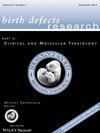用于唇腭裂研究和监测的基于icd -10的扩展代码集。
Q Medicine
Birth defects research. Part A, Clinical and molecular teratology
Pub Date : 2016-11-01
DOI:10.1002/bdra.23544
引用次数: 11
摘要
背景2015年10月1日,美国要求使用《国际疾病分类临床修改第十版》(ICD-10-CM)进行诊断编码。ICD-10-CM代码集仅限于唇裂和/或腭裂的总类别(仅使用可能的七个字符中的四个)。方法对ICD-10-CM代码集进行扩充,以提高个别临床、研究和统计项目所需的诊断准确性。(这与疾病控制和预防中心/英国儿科协会代码扩展ICD-9代码库的方式类似。)结果:我们提出的扩展并没有取代临床、行政或金融交易中ICD-10-CM的必要使用。相反,它是作为一组可选的间隙代码提供的,可以并行地用于记录具有表型准确性的真正分类级数据。结论扩展集可“折叠”成官方ICD-10-CM规范;这提高了研究和流行病学数据库中包含的扩展代码与医院电子病历系统和行政计费数据中的标准代码的兼容性。出生缺陷研究(A辑)(06):905-914,2016。©2016 Wiley期刊公司本文章由计算机程序翻译,如有差异,请以英文原文为准。
ICD-10-based expanded code set for use in cleft lip/palate research and surveillance.
BACKGROUND
On October 1, 2015, the United States required use of the Clinical Modification of the International Classification of Diseases, 10th Revision (ICD-10-CM) for diagnostic coding. The ICD-10-CM code set is limited to gross categories for cleft lip and/or cleft palate (using only four of a possible seven characters).
METHODS
Herein, a clinically useful expansion of the ICD-10-CM code set is proposed to improve the diagnostic accuracy necessary for individual clinical, research, and statistical projects that require it. (This is similar to how the Centers for Disease Control and Prevention/British Paediatric Association Code served to extend the ICD-9 code base.) RESULTS: Our proposed expansion does not replace the required use of ICD-10-CM for clinical, administrative, or financial transactions. Rather, it is offered as an optional set of cleft codes that could be used in parallel to document true classification-level data with phenotypic accuracy.
CONCLUSION
The expanded set is "collapsible" into the official ICD-10-CM codes; this improves compatibility of the expanded codes that would be contained in research and epidemiologic databases with the standard codes from hospital electronic medical record systems and administrative billing data. Birth Defects Research (Part A) 106:905-914, 2016. © 2016 Wiley Periodicals, Inc.
求助全文
通过发布文献求助,成功后即可免费获取论文全文。
去求助
来源期刊

Birth defects research. Part A, Clinical and molecular teratology
医药科学, 胎儿发育与产前诊断, 生殖系统/围生医学/新生儿
CiteScore
1.86
自引率
0.00%
发文量
0
审稿时长
3 months
 求助内容:
求助内容: 应助结果提醒方式:
应助结果提醒方式:


